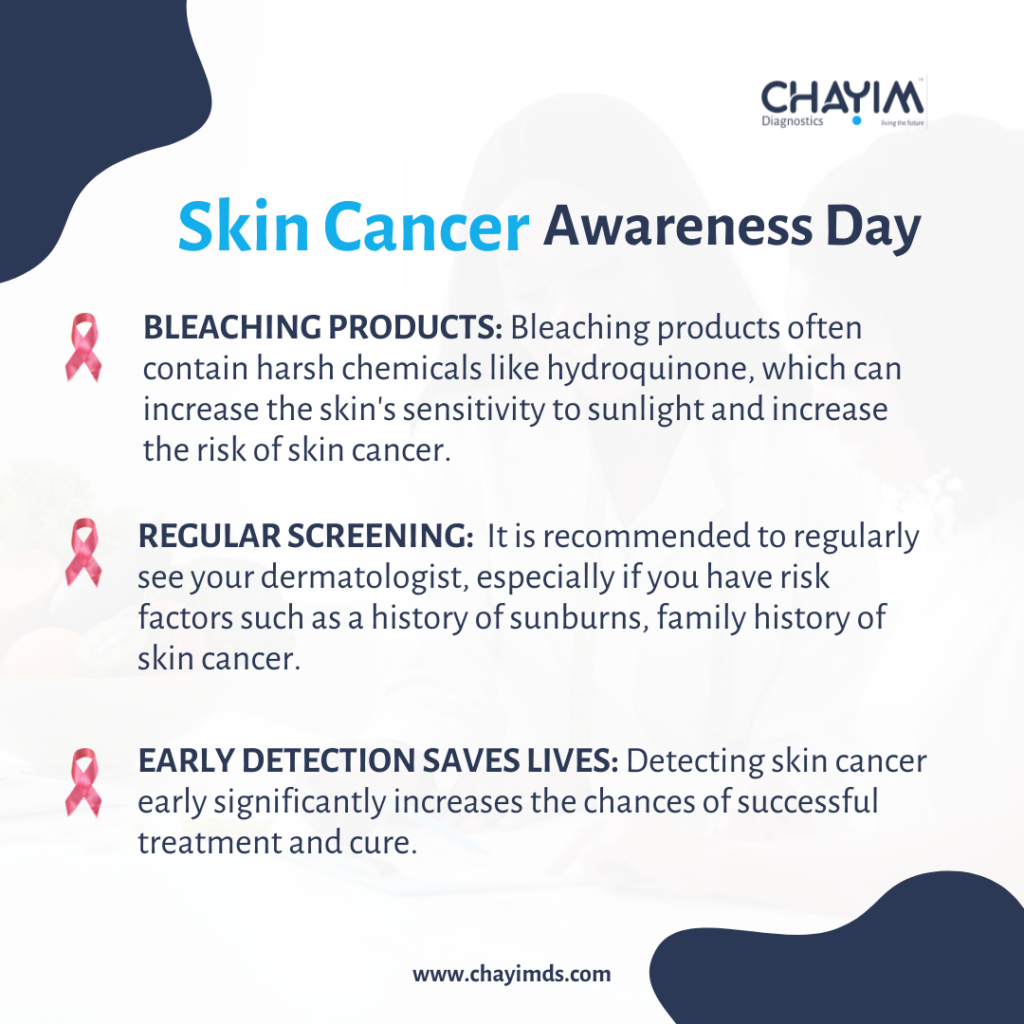SKIN CANCER AWARENESS

Skin cancer is a condition characterized by the abnormal growth of skin cells, typically caused by excessive exposure to ultraviolet (UV) radiation from sunlight and most commonly bleaching. It can develop in any part of the body including lips, hands, feet, scalp, eyelids, toes, groin etc.
In Nigeria, one of the causes of skin cancer is skin bleaching and according to statistics from The World Health Organization on skin bleaching in Africa a public health problem, it shows that 77% of Nigerian women use skin bleaching products.
SKIN BLEACHING
Skin bleaching refers to the use of chemicals or products to lighten the skin tone. These skin bleaching agents reduce the concentration and production of melanin in the skin. Melanin is a component that gives color to the skin and protects it against the harmful effects of ultraviolet (UV) rays. While some people claim they may not be any adverse effects of skin bleaching, it poses significant health risks which includes:
Skin Damage:
Skin bleaching products contain harsh chemicals that disrupt the skin’s natural protection and repair mechanisms leading to irritation, inflammation, and increased sensitivity to UV radiation which put the individuals at a higher risk of skin cancers.
Health Complications:
Ingredients such as hydroquinone, mercury, and corticosteroids found in some bleaching products can be absorbed into the bloodstream, potentially causing systemic health issues like kidney damage, hormonal imbalances, and neurologic problems.
Myths about Skin Cancer
Dark-skinned people don’t get skin cancer.
Anyone with skin can get skin cancer. It affects individuals of all skin tones although, it is more prevalent among individuals with lighter skin tones. It has been observed the mortality rates are elevated in black people due to late and poor diagnosis and treatment.
More Sunlight, More Vitamin D.
While it is true that exposure to sunlight increases the production of vitamin D, doing so at random hours and excessively could put you at risk of sunburn and skin cancers. Exposure to early morning sun with proper protection from ultraviolet rays is the best way to achieve this goal. You also don’t need to stay long hours in the sun to get vitamin D as food substances such as eggs, salmon fish, oranges, cod liver oil are great sources of this Vitamin as well.
Only sun exposure causes skin cancer.
Excessive exposure to the sun over prolonged periods could be a major contributing factor to the development of skin cancers however, regular exposure to ultraviolet rays from tanning beds and X-ray machines, skin bleaching, family history of skin cancer and a compromised immune system could increase one’s chances of getting skin cancer.
Sunscreen gives better protection from sun rays.
Sunscreen doesn’t give total protection from sun rays. It is advisable to stay out of the sun, especially between 10 a.m. and 4 p.m., and to wear protective clothing if you must be in the sun.
Bleaching creams are not harmful if not used for long.
Bleaching agents impair the skin’s ability to repair and protect itself like it should from the moment they start to take effect. The adverse effects of bleaching one’s skin could occur more rapidly in people that use these products more often. However, it does not rule out skin damage and there is a likelihood of skin cancer for people that do use it as often.
Warning symptoms of Skin Cancer
It is very important to have a dermatologist and see one regularly at least, once every year even if there are no obvious complaints however changes to the skin which are unfamiliar even as mild as spots that persist for two weeks or longer should be reported immediately to your dermatologist. Other signs to watch out for include:
- A sore that bleeds, doesn’t fully heal, or that reoccurs.
- A spot that is itchy or painful.
- A firm, red nodule / skin-colored shiny bump on the top of the skin
- Changes in the appearance of a mole
- Lesions with a dark appearance on the mucous membranes (such as the nose, mouth, vagina, or anus) or the fingers and toes.
Prevention
- Regular Skin Assessments: Skin cancers, unlike other forms of cancer, form outside the body and are often visible. Therefore, it is important to regularly examine your skin and familiarize yourself with changes that may occur to moles, spots and bumps.
- Sun Protection: Protect your skin from UV radiation by wearing sunscreen with SPF 30 or higher, seeking shade during peak sun hours (10 am to 4 pm), wearing protective clothing (hats, sunglasses, long sleeves), and avoid skincare products with bleaching agents.
- Healthy Lifestyle: Maintain a healthy diet rich in fruits, vegetables, and antioxidants, stay hydrated, engage in regular physical activity, avoid smoking, and limit alcohol consumption.
- Regular Check-ups: Visit your dermatologist regularly for overall health assessments, including skin checks and cancer screenings.
- Education and Awareness: Educate yourself about skin cancer risk factors, warning signs, and preventive measures. Raise awareness among family members, friends, and community members about the importance of skin cancer prevention and early detection.
Chayim Diagnostics endeavors to raise awareness regarding skin cancer. We urge you to take proactive steps to safeguard your skin’s health starting today.


Responses